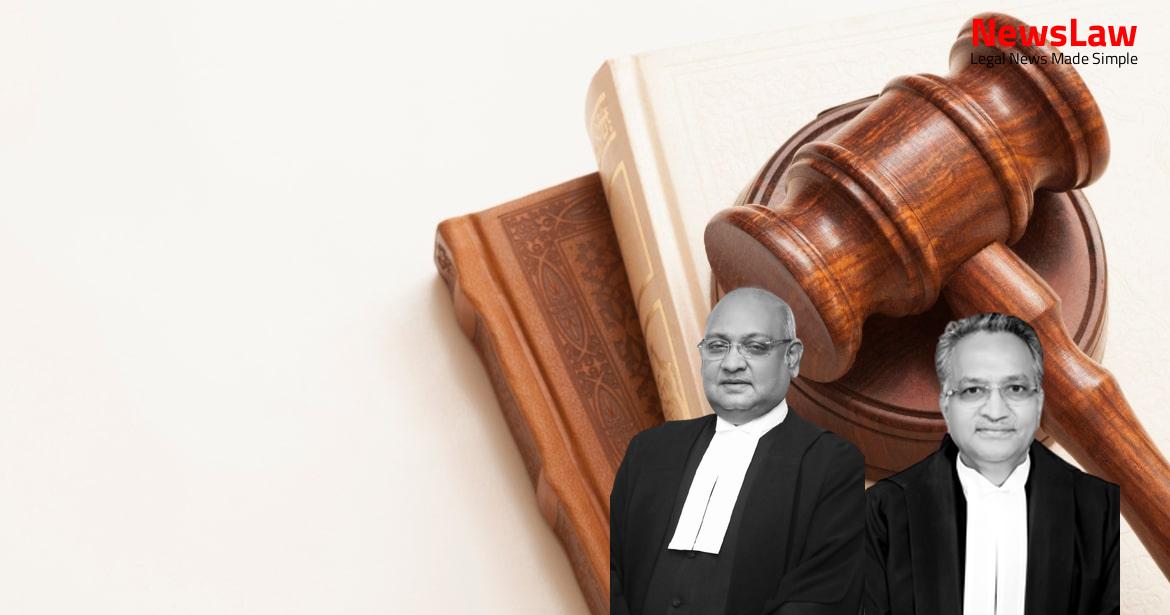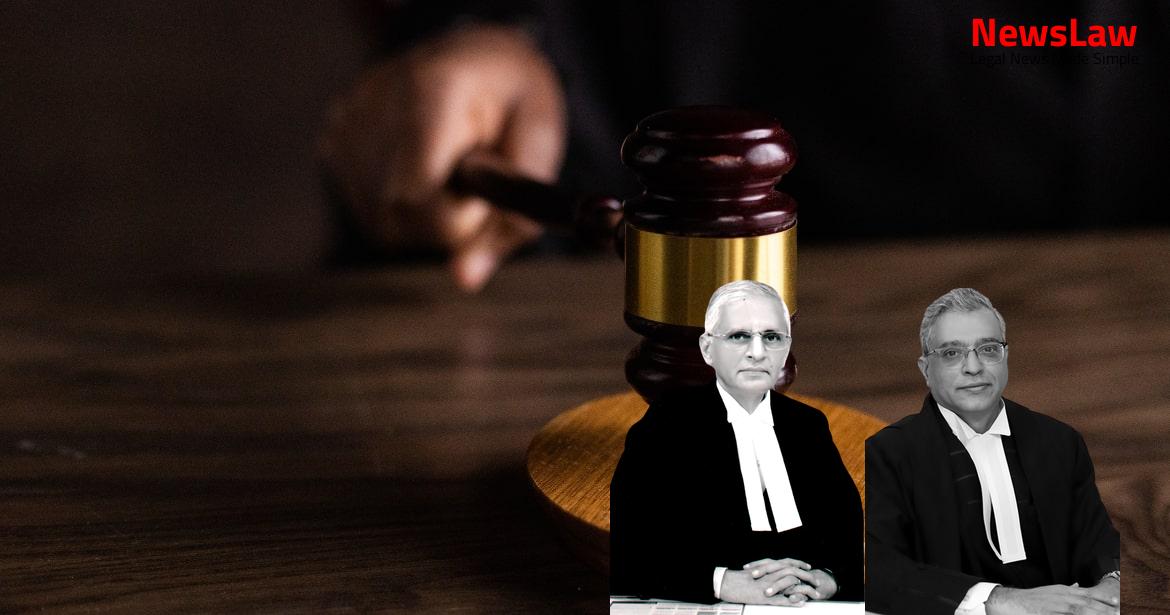In a recent landmark judgment by the Supreme Court of India, the case of Severe Displeasure (Recordable) has been brought into focus. The matter revolves around the reconsideration of the punishment by the competent authority, sparking debates on military law and disciplinary actions. Stay informed on this intriguing legal battle that highlights the complexities of military regulations and the power of judicial review.
Facts
- Lt. Colonel Kuldeep Yadav was detailed for Officers Advance Computer Technical (OACT) course Serial No.20 at MCEME, Secunderabad from 4 June, 2011 to 23 March, 2012.
- He maintained contact with Ms. Sueli through various means from 2009 to 2011 and stayed with her at the Army premises in Goa in October 2011.
- He wrote unauthorized letters of sponsorship for facilitating Ms. Sueli’s visit to India.
- The Complainant was found blameworthy for violating provisions of certain instructions regarding contact with foreign nationals in 1987.
- A Show Cause Notice was issued, and upon not satisfying the authorities, Severe Displeasure (Recordable) was conveyed to Lt. Colonel Kuldeep Yadav.
- The Tribunal observed that the challenge was not about the source of power of the competent authority but focused on the possibility of access to official documents on the respondent’s laptop.
- The competent authorities of the Army did not find the respondent’s misdeed serious enough to proceed with disciplinary action for maintaining contact with a foreign national without permission and violating security instructions.
- The respondent admitted the allegations and sought leniency in response to the show cause notice.
- The Tribunal noted that rejection of the statutory complaint by the appropriate authority, without considering the exemplary service record of the respondent, does not invalidate the order of Severe Displeasure (Recordable).
- The Tribunal found that errors in personal details given by the respondent in the register of the Army Guest House did not affect the validity of the Severe Displeasure (Recordable) order.
- Policy on awarding Severe Displeasure (Recordable) to Officers and JCOs and ‘Code of Conduct of Selection Boards by Quantification System’ were referenced while considering the order.
- The Tribunal opined that the purpose of 1987 Instructions would be defeated if narrowly interpreted to apply only to initial contact with foreign nationals.
- The Tribunal rejected the argument that rejection of the statutory complaint was not due to the foreign national having access to classified documents.
- The respondent’s explanation for not disclosing staying with a foreign national lady was considered valid by the Tribunal.
- A clerical error in mentioning the date of Instructions in the show cause notice did not change the nature of the allegations or invalidate the notice, especially since the respondent accepted the allegations. No prejudice was caused due to the incorrect year mentioned.
Also Read: Balancing Justice: Case Summary of C.P. No. 16/2017
Issue
- 1.1
Also Read: Judgment by Supreme Court of India in M/s. Bhilwara Processors Ltd. vs. Department of Central Excise
Arguments
- The foundation of the show cause notice leading to the censure order was misplaced.
- The Tribunal granted substantive relief by directing the competent authority to award a different censure.
- The members of the Selection Boards were misled due to incorrect disciplinary inputs about the respondent.
- The Discipline & Vigilance Policy was wrongly applied in this case.
- The Military Secretary Branch Policy was found to be inapplicable.
- The Tribunal has the authority to interfere with the punishment given by the disciplinary authority if it is deemed excessive or disproportionate.
- This power of interference is limited and can only be exercised in exceptional cases where the punishment is shockingly unreasonable.
- The Tribunal is not usually expected to examine the grounds of the action taken against the delinquent officer.
- The respondent asserts that the Tribunal’s order is unexceptional, suggesting that any intervention by the Court should allow the respondent to challenge the Tribunal’s decision on the merits of the action taken against him.
Also Read: Landmark Judgment: Consolidation of FIRs and Bail Granted in ‘Grand Venice’ Project Case
Analysis
- The Tribunal analyzed the seriousness of the allegations against the officer as noted in the show cause notice, which he admitted.
- The Tribunal considered whether the punishment of ‘Severe Displeasure (Recordable)’ was too harsh based on the officer’s conduct and service profile.
- The Tribunal noted that the officer had an outstanding service record and efficient performance.
- The officer admitted to the allegations in the show cause notice, suggesting a momentary loss of indiscretion.
- The Tribunal believed that the punishment was shockingly disproportionate despite the officer’s admission.
- The Tribunal mistakenly assumed that the competent authority opted for administrative action over Court Martial due to the non-serious nature of the misconduct.
- The Tribunal ordered a reconsideration of the punishment by the competent authority instead of substituting it themselves.
- The Tribunal may have overlooked the seriousness of the officer’s conduct, which warranted a censure according to applicable policy.
- The Tribunal’s interference with the award of ‘Severe Displeasure (Recordable)’ was deemed unjust and not commensurate with the officer’s lapses.
- The Tribunal failed to adequately consider the past service records of the officer when evaluating the punishment.
- PRE_RELIED
- the basis on which the Tribunal chose to interfere is deemed indefensible
- the conclusion reached by the Tribunal must fall due to the faulty basis of interference
- the allegations in the show cause notice warrant stern action against Original Name
- the competent authority’s discretion and the award of censure of Severe Displeasure (Recordable) are upheld as appropriate
- the Tribunal has already addressed and rejected the grounds for challenge to the competent authority’s decision
- Original Name admitted to the allegations in the show cause notice and sought leniency from the competent authority
- Original Name cannot now challenge the decision after admitting to the allegations and seeking leniency
Decision
- Government of India decision dated 30 April, 2014, rejecting the statutory complaint is upheld
- Order passed by GOC-in-C dated 10 May, 2013 is restored
- Prayer to challenge adverse findings of Tribunal on merits is declined
- Impugned judgment and order of Armed Forces Tribunal is quashed and set aside
- Appeal allowed with no order as to costs
Case Title: UNION OF INDIA Vs. LT. COL. KULDEEP YADAV
Case Number: C.A. No.-007603 / 2019



